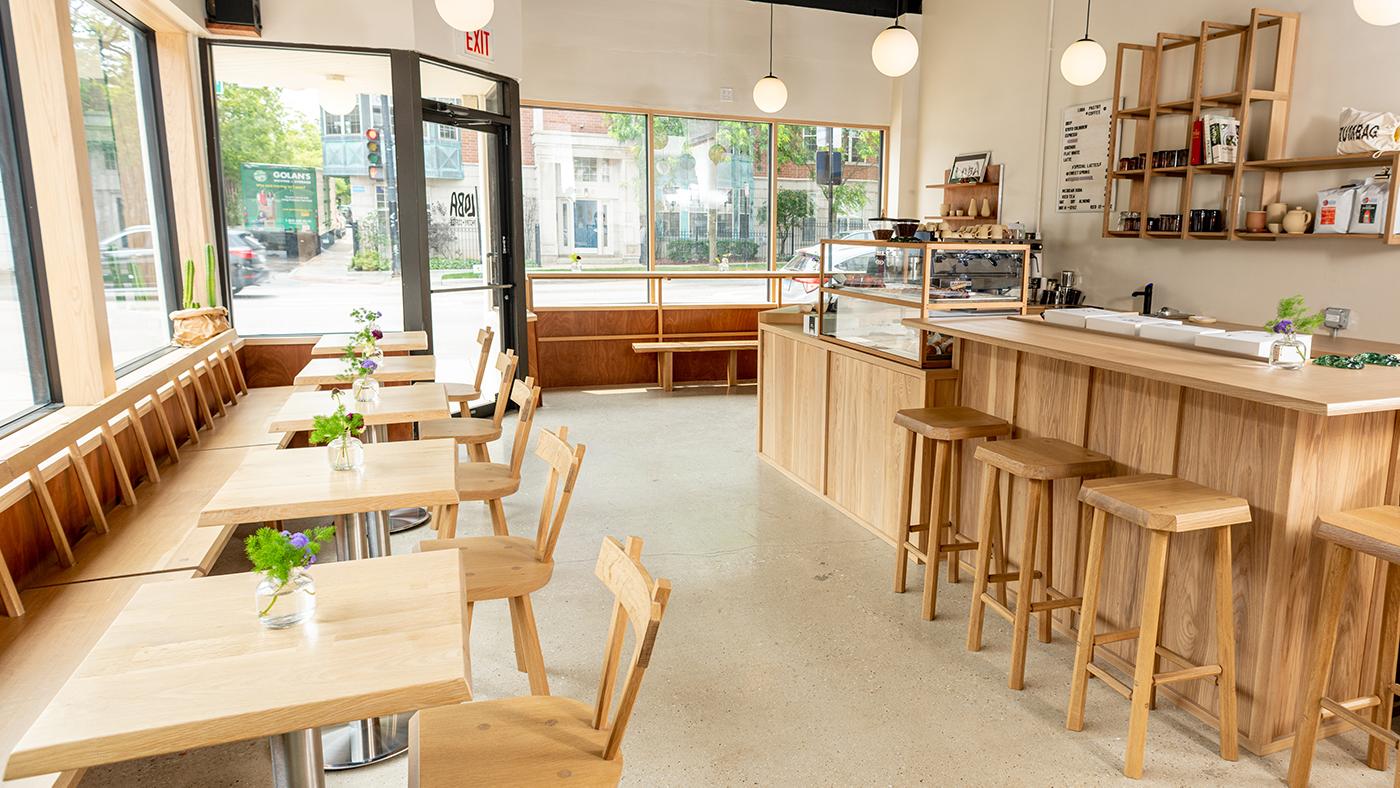Regulation Crowdfunding Lets Small Restaurant Owners Turn to Grassroots Investors for Financing
Daniel Hautzinger
August 11, 2023

Get more recipes, food news, and stories by signing up for our Deep Dish newsletter.
When Mitchell Abou Jamra started a brand management company for small alcohol producers in 2018, he took out a small business loan from a bank “with an 18.8% interest rate, or maybe it was even twenty-something” to get the business off the ground, he recalls. When the COVID-19 pandemic hit, his business dried up and he gave up the company, losing money.
He then opened Evette’s, a casual restaurant that serves a mash-up of Mexican and Lebanese food, which was named one of “America’s 50 Best Restaurants” by the New York Times in 2022. He now has three locations in Chicago, as well as a sandwich shop called All Too Well that’s next door to the original Evette’s in Lincoln Park. But, five years later, he’s only just paying off that initial small business loan for a company that no longer exists.
“That was the only time I ever [took out a bank loan], and I swore to myself I was never going to do it again unless it made viable sense,” he says. He had favorable circumstances for opening his restaurants, especially after the acclaim of the original Evette’s, so he didn’t need to take out another loan to start them off. But this year, when he decided to upgrade some equipment and also renovate the newest Evette’s, in Lakeview, to add in windows that can make the storefront open-air, he required financing. So he turned to Honeycomb Credit.
Honeycomb is a platform for small businesses to acquire investments from small investors in a form of financing called regulation crowdfunding. As in typical forms of crowdfunding, businesses solicit money from supporters through a registered online funding portal such as Honeycomb, Mainvest, SMBX, or Republic Local. But, unlike with Kickstarter or GoFundMe, people who contribute are investors who should be paid back with interest over time, earning a profit if the business succeeds.
“It takes a village,” says Taylor Mason, who raised $51,475 through Honeycomb to open a brick and mortar restaurant in Little Italy for her pop-up catering company, Taylor’s Tacos, which she co-owns with her wife. “We wanted to give back to the community, not take from it.”
The ability via regulation crowdfunding to repay customers, family, or friends who give money to support a business is one of the draws of the model. Valeria Socorro Velazquez Lindsten has raised funds through both GoFundMe and Honeycomb for her bakery Loba Pastry over the past few years as she sought to renovate a new space in Roscoe Village, which opened earlier this year. With traditional crowdfunding, “People do it out of the kindness of their hearts, and it’s great,” she says. But, “for me, there was a little bit of shame associated with it, especially as an immigrant. People always talk about immigrants getting handouts…Of course, I needed help, but I didn’t feel necessarily excited or proud to do it.
“Honeycomb is a nice option because your community can help you, but they also get something back,” she says.
Regulation crowdfunding is a relatively new form of investment that originated in the JOBS Act, which was enacted under the Obama Administration. “Dating back to the Great Depression, there were a whole bunch of really fraudulent securities that were happening in the 1920s,” explains George Cook, the CEO and co-founder of Honeycomb. Federal regulators stepped in and required anyone investing in a privately held company to be accredited, or essentially have over a million dollars in net worth.
“What it meant was that most people—most non-accredited, average people—were completely prohibited from investing in privately held small businesses,” Cook says. The JOBS Act modified some of those restrictions, allowing for regulation crowdfunding, among other things. “In a nutshell, what it says is [that] a privately held small business, though not a big, publicly traded company, can raise debt or equity or whatever type of financial instrument from anyone, but it has to be through a registered funding portal and there has to be certain levels of disclosure and transparency around it,” Cook explains.
What that means is that businesses like Evette’s or Taylor’s Tacos can solicit investments on a platform like Honeycomb, which handles Securities and Exchange Commission disclosures and collects and disburses the funds to the business and the loan repayments to the investors.
While businesses have to apply and demonstrate financial viability and health to be accepted onto Honeycomb, it is generally easier to access a loan through it or other regulation crowdfunding platforms than it is through a bank.
“We are chronically underinvesting in small businesses, but small businesses have so many positive knock-on effects in the communities that they’re serving,” Cook says. He notes that the average small business loan amount is currently $663,000—much higher than what many small businesses need, or can afford to pay back. (Funding targets on Honeycomb range from around $20,000 to $125,000.) While nonprofits and microloans offer small amounts of funding, “There’s this whole missing generation of small businesses that are being really overlooked right now,” Cook says.
That can be especially true in the food and beverage industry, which makes up a large portion of Honeycomb’s offerings, because such companies are perceived as risky. Talented chefs or bakers may have plenty of experience in the kitchen, but none in finances or business. They are left adrift to navigate accounting, financial planning, permitting, and government regulation on their own as they try to open a storefront or start a company. Velazquez Lindsten was unable to secure a bank loan, even though she had five years of demonstrated success with Loba, a problem she wrote about in an essay for Eater on the difficulties of opening and financing a food business.
“I guess I don’t have enough credit history, or cosigners, or family wealth to vouch for me,” she says. “To be completely honest, if I didn’t have to use Honeycomb, I wouldn’t have. But for a lot of businesses like mine—small enough, woman-owned, immigrant-owned—we don’t really have a lot of options for financing.”
People of color and women have a harder time accessing capital than white men in America, which might explain why many have turned to alternative modes of financing such as regulation crowdfunding. Fifty-one percent of the almost 350 businesses Honeycomb has worked with are BIPOC-owned, while 65% are woman-owned. Thirty-four percent are located in low-to-moderate income communities. “We’re touching a lot of businesses that have that direct touchpoint with their community, the type of place that makes communities vibrant and flourish,” Cook says.
He sees Honeycomb as replacing the small community banks that have vanished over recent decades as big banks have grown ever larger. He himself comes from a family that has run a small community bank in rural Appalachia for 130 years. (Honeycomb is based nearby in Pittsburgh.) He believes that community banks can assess a business in a more holistic sense than big, national banks that aren’t integrated into the local fabric.
Community bank employees “shopped [at that small business], they had friends that worked there or went there. And so there was all this qualitative data about that business,” Cook says. “Do they treat their customers well? Do they treat their employees well? Do they shovel their sidewalk when it snows? Are they a fit for their community? And that qualitative data, whether consciously or subconsciously, was working its way into a community bank’s underwriting decision.”
By allowing community members or customers to invest directly in a small business in their neighborhood, he believes that Honeycomb is restoring some of that qualitative assessment to small business financing. While Honeycomb checks the quantitative aspects of a business by looking at their financials, “We’re empowering local people to share with us which businesses they want to see prosper in their own neighborhood,” he says.
“It felt local—even though it’s not,” says Evette's Abou Jamra of Honeycomb. “Like they were the local restaurant instead of the national chain.”
Investing in a business via regulation crowdfunding is a bit more involved than donating to a GoFundMe. Honeycomb has to run an anti-money laundering check and a “know your customer” check on an investor who sets up an account. They can then invest in any of the current offerings on the platform, with a minimum of $100. When the funding goal is reached, the loan is executed and the funds are disbursed to the business. The business then makes monthly payments to Honeycomb, which automatically distributes them to the investors.
“The model is kind of a cool model, because you are able to invest in small companies and help them get where they need to go without making a major investment,” Abou Jamra says.
Honeycomb also tries to ensure the success of the businesses using it by offering support throughout their campaign in order to help them reach their funding goals. They film an introductory video featuring the business, offer social media strategies, and provide an expert to help with fundraising tactics.
“They definitely stay in touch with us and watch our progress,” says Mason of Taylor's Tacos.
If it works, it can be beneficial all around. A business can access a loan while also gaining the support of customers who are literally invested in their survival, and so might evangelize for it and patronize it more often. Investors get to turn a profit and support a business they like. And Honeycomb makes money from a $250 posting fee, a small investor fee levied on any individual investment, and a “success fee” that is a percentage of the money raised.
And yet, while many small business loans do have higher interest rates—like Abou Jamra’s 18.8%—Honeycomb’s current average rate of about 12% can still be difficult for a business just starting off in a tight-margin industry to stomach. “While it’s a very good option, it sucks that there’s a lot of people whose only option it is,” says Velazquez Lindsten. “I know that Honeycomb is not a predatory company, but borrowing money at 12% interest rate is still a lot. You do have more time to pay back, and you’re paying back your community, but it’s still a very high interest rate that you can’t walk away from.”
Cook says that, “For a small business, it’s still pretty significantly cheaper than a credit card or an online merchant cash advance, which can be quite expensive for businesses.”
If a business on Honeycomb does fail or struggle to pay back the loan—a relatively uncommon occurrence, so far—the investors can vote on a course of action that ranges from forgiving their piece of the debt to working out a plan with the business to hiring a collections firm. Except in rare instances, investors on Honeycomb do not acquire equity in a company, meaning they do not have any ownership of it—a selling point of the platform for many small business owners who want to maintain full ownership, rather than being beholden to a major investor who is a partial owner.
“Everybody knows what they’re getting into,” says Abou Jamra. “There’s no hidden fees or hidden agendas.”
“Part of the reason why I wanted to open my own business is because the culinary industry is male-dominated and it has a lot of toxicity,” says Loba’s Velazquez Lindsten. “I knew that if I wanted to have a future in my industry, I needed to build it myself. Now that I have a business that’s going fairly well, I get to return the favor and help people that were in my situation.”







